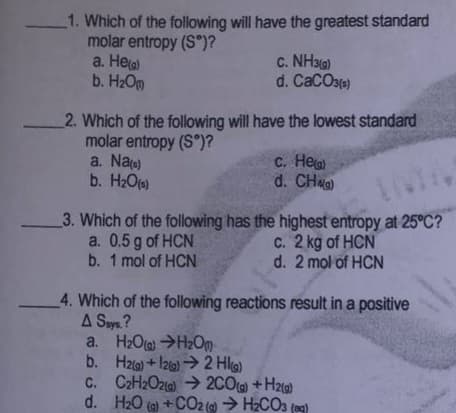1. Which of the following will have the greatest standard molar entropy (S°)? a. Hea b. H2Om c. NH3) d. CaCO3() 2. Which of the following will have the lowest standard molar entropy (S°)? a. Nao) b. H-О с. Неш d. CHu 3. Which of the following has the highest entropy at 25°C? a. 0.5 g of HCN b. 1 mol of HCN C. 2 kg of HCN d. 2 mol of HCN 4. Which of the following reactions result in a positive A Says? a. H2O()H2On b. H2a) + l2)→ 2 Hla) C. CaH2Oz1a) → 2CO +H2g) d. H20 (g) +CO2 () → H2CO3 (ag)
1. Which of the following will have the greatest standard molar entropy (S°)? a. Hea b. H2Om c. NH3) d. CaCO3() 2. Which of the following will have the lowest standard molar entropy (S°)? a. Nao) b. H-О с. Неш d. CHu 3. Which of the following has the highest entropy at 25°C? a. 0.5 g of HCN b. 1 mol of HCN C. 2 kg of HCN d. 2 mol of HCN 4. Which of the following reactions result in a positive A Says? a. H2O()H2On b. H2a) + l2)→ 2 Hla) C. CaH2Oz1a) → 2CO +H2g) d. H20 (g) +CO2 () → H2CO3 (ag)
Chemistry for Engineering Students
4th Edition
ISBN:9781337398909
Author:Lawrence S. Brown, Tom Holme
Publisher:Lawrence S. Brown, Tom Holme
Chapter10: Entropy And The Second Law Of Thermodynamics
Section: Chapter Questions
Problem 10.41PAE
Related questions
Question
Answer number 1 to 4 pls. I don't want to waste my money here.

Transcribed Image Text:1. Which of the following will have the greatest standard
molar entropy (S°)?
a. Hea
b. H2Om
c. NH30)
d. CaCO3()
2. Which of the following will have the lowest standard
molar entropy (S°)?
a. Nao)
b. H-О
с. Нев
d. CHe
3. Which of the following has the highest entropy at 25°C?
a. 0.5 g of HCN
b. 1 mol of HCN
C. 2 kg of HCN
d. 2 mol of HCN
4. Which of the following reactions result in a positive
A Says?
a. H2O(@)H2On
b. Hza) + l2)→ 2 Hla)
C. C2H2Ozta) → 2CO +Hz)
d. H20 (e) +CO2 () → H2CO3 (ag)
Expert Solution
This question has been solved!
Explore an expertly crafted, step-by-step solution for a thorough understanding of key concepts.
This is a popular solution!
Trending now
This is a popular solution!
Step by step
Solved in 2 steps with 1 images

Knowledge Booster
Learn more about
Need a deep-dive on the concept behind this application? Look no further. Learn more about this topic, chemistry and related others by exploring similar questions and additional content below.Recommended textbooks for you

Chemistry for Engineering Students
Chemistry
ISBN:
9781337398909
Author:
Lawrence S. Brown, Tom Holme
Publisher:
Cengage Learning

General Chemistry - Standalone book (MindTap Cour…
Chemistry
ISBN:
9781305580343
Author:
Steven D. Gammon, Ebbing, Darrell Ebbing, Steven D., Darrell; Gammon, Darrell Ebbing; Steven D. Gammon, Darrell D.; Gammon, Ebbing; Steven D. Gammon; Darrell
Publisher:
Cengage Learning

Chemistry by OpenStax (2015-05-04)
Chemistry
ISBN:
9781938168390
Author:
Klaus Theopold, Richard H Langley, Paul Flowers, William R. Robinson, Mark Blaser
Publisher:
OpenStax

Chemistry for Engineering Students
Chemistry
ISBN:
9781337398909
Author:
Lawrence S. Brown, Tom Holme
Publisher:
Cengage Learning

General Chemistry - Standalone book (MindTap Cour…
Chemistry
ISBN:
9781305580343
Author:
Steven D. Gammon, Ebbing, Darrell Ebbing, Steven D., Darrell; Gammon, Darrell Ebbing; Steven D. Gammon, Darrell D.; Gammon, Ebbing; Steven D. Gammon; Darrell
Publisher:
Cengage Learning

Chemistry by OpenStax (2015-05-04)
Chemistry
ISBN:
9781938168390
Author:
Klaus Theopold, Richard H Langley, Paul Flowers, William R. Robinson, Mark Blaser
Publisher:
OpenStax


Chemistry: An Atoms First Approach
Chemistry
ISBN:
9781305079243
Author:
Steven S. Zumdahl, Susan A. Zumdahl
Publisher:
Cengage Learning

Chemistry
Chemistry
ISBN:
9781305957404
Author:
Steven S. Zumdahl, Susan A. Zumdahl, Donald J. DeCoste
Publisher:
Cengage Learning